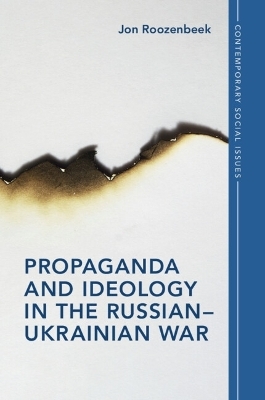
Propaganda and Ideology in the Russian–Ukrainian War
Seiten
2024
Cambridge University Press (Verlag)
978-1-009-24400-8 (ISBN)
Cambridge University Press (Verlag)
978-1-009-24400-8 (ISBN)
Drawing on tens of thousands of historical and legal documents, Jon Roozenbeek offers the first comprehensive analysis of the key role of propaganda in the Russian-Ukrainian war, and its use in modern military conflict. Suitable for scholars and students in political science, peace and conflict studies, psychology, and communication.
Russia's invasion of Ukraine is one of the most important conflicts of the twenty-first century. With the start of military hostilities in 2014 also came an onslaught of propaganda, to both convince and confuse audiences worldwide about the war's historical and ideological underpinnings. Based on extensive research drawing on tens of thousands of news articles and hundreds of pages of legal documents and internal correspondence, this book offers the first comprehensive analysis of the role of propaganda, ideology, and identity in the Russian-Ukrainian war. It argues that, despite Russia's efforts to set up a media machine at home and abroad with eight years of propaganda legitimising Russia's presence in eastern Ukraine, Russia failed to vocalise a convincing alternative to Ukrainian nationhood. Instead, Russian propaganda backfired: Ukraine is now more united than ever before.
Russia's invasion of Ukraine is one of the most important conflicts of the twenty-first century. With the start of military hostilities in 2014 also came an onslaught of propaganda, to both convince and confuse audiences worldwide about the war's historical and ideological underpinnings. Based on extensive research drawing on tens of thousands of news articles and hundreds of pages of legal documents and internal correspondence, this book offers the first comprehensive analysis of the role of propaganda, ideology, and identity in the Russian-Ukrainian war. It argues that, despite Russia's efforts to set up a media machine at home and abroad with eight years of propaganda legitimising Russia's presence in eastern Ukraine, Russia failed to vocalise a convincing alternative to Ukrainian nationhood. Instead, Russian propaganda backfired: Ukraine is now more united than ever before.
Jon Roozenbeek is an award-winning researcher whose work straddles psychology, area studies, and computer science. He studies the psychology of misinformation and group identity in times of conflict. Roozenbeek holds a Ph.D. in Slavonic Studies from the University of Cambridge and is the author of The Psychology of Misinformation (Cambridge University Press, 2024) with Sander van der Linden.
Introduction; 1. A history of Russian–Ukrainian relations; 2. The politics of the Donbas 'Republics'; 3. Building a propaganda machine; 4. Newspaper narratives in occupied Ukraine; 5. Identity and ideology in online media; 6. The consequences of propaganda; Concluding remarks; Appendices.
| Erscheinungsdatum | 14.05.2024 |
|---|---|
| Reihe/Serie | Contemporary Social Issues Series |
| Zusatzinfo | Worked examples or Exercises |
| Verlagsort | Cambridge |
| Sprache | englisch |
| Themenwelt | Geisteswissenschaften ► Geschichte ► Regional- / Ländergeschichte |
| Geisteswissenschaften ► Psychologie ► Sozialpsychologie | |
| Sozialwissenschaften ► Kommunikation / Medien ► Medienwissenschaft | |
| ISBN-10 | 1-009-24400-0 / 1009244000 |
| ISBN-13 | 978-1-009-24400-8 / 9781009244008 |
| Zustand | Neuware |
| Informationen gemäß Produktsicherheitsverordnung (GPSR) | |
| Haben Sie eine Frage zum Produkt? |


